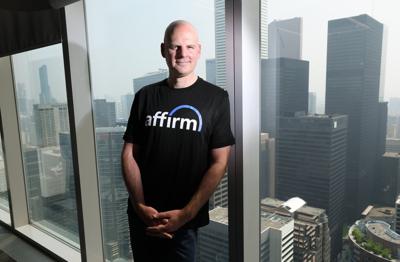Wayne Pommen was interested in buy-now-pay-later financing (BNPL) when it was too small for the big banks.
Now, it’s ┬Āand its use is booming among young people.┬Ā
The Toronto-based chief revenue officer of U.S.-based BNPL giant Affirm says the alternative loan product is the preferred payment option for millions.
Rather than rolling credit, monthly bills and steep penalties, BNPL financing providers invite shoppers to pay for specific purchases in predetermined instalments.
ŌĆ£We don’t have any of that funny business,ŌĆØ the former professional rower says. ŌĆ£No late fees, no compounding interest accounts, no deferred interest; itŌĆÖs an easier to use product and a much more customer-focused product.ŌĆØ
Pommen gained an appreciation for the emerging payment category while in private equity and searching for alternative financing product investment opportunities too small for the big banks in the early 2010s.
ZenaTech CEO Shaun Passley says drone technology is ‘something more sci-fi’ these days being
ThatŌĆÖs when he discovered a Canadian company helping customers defer payments for costly health care services.
In 2015 Pommen joined as an investor, president and CEO. The next year, taking a cue from global competitors, the company pivoted toward major online retailers, and rebranded as PayBright.
PayBright experienced explosive growth, signing major retail partnerships with the likes of Wayfair, Samsung, HudsonŌĆÖs Bay, and Apple, ┬Āand expanding to a team of 200.
Pommen says an acquisition wasnŌĆÖt part of the plan, but he was left with no choice after the pandemic e-commerce boom.
ŌĆ£There was a lot of investment capital going into other players in our industry, and it was becoming clear that they were all going to come to Canada,ŌĆØ says the Victoria-B.C. native. ŌĆ£We were a bit too small and a bit too far behind to compete, and at the same time those players started to express interest in acquiring us.ŌĆØ
In early 2021 PayBright was acquired by American BNPL giant Affirm for $340 million. Its services have been used by nearly 22 million consumers┬Āwho average 5.6 transactions a year of $273 each, including 2.5 million Canadians. In the last 12 months Affirm processed more than $33.5 billion in payments.
Today, seven per cent of every eCommerce retail transaction in the U.S. is processed through a buy-now-pay-later provider. According to a 2021 by the Financial Consumer Agency of Canada (FCAC), 34 per cent of Canadians are familiar with BNPL programs and eight per cent had used them.
The industryŌĆÖs rapid ascent, however, has raised concerns over enabling consumers to overborrow and make purchases they canŌĆÖt afford. ┬Ā┬Ā┬Ā
The Star recently spoke with Pommen from the companyŌĆÖs Canadian headquarters in ║ŻĮŪ╔ńŪ°╣┘═°about the industryŌĆÖs growth, why many people ŌĆö and especially young people ŌĆö prefer the instalment model, and whether the industry is encouraging unhealthy habits.
How did you end up in the financial technology industry despite not studying either?
I didnŌĆÖt know what I wanted to be when I grew up, but I was a professional rower. I was the captain of the Harvard Crew and president of the Cambridge Crew, and rowed on the Canadian National Team, so that was my focus.
At Harvard I majored in sociology and French, then did a masterŌĆÖs in philosophy at Cambridge, followed by a PhD in international relations.
After I graduated in 2006, I did what most people do when they donŌĆÖt know what they want to do, which is management consulting. I worked at Bain & CompanyŌĆÖs London office until my wife, who is a neuroscientist academic, got a tenure-tracked position at the University of Toronto, so I transferred to the ║ŻĮŪ╔ńŪ°╣┘═°office in 2008.
The next year, I got an opportunity to join a private equity firm called TorQuest Partners, which is where I started developing an interest in nonbank financial services. Canada has these huge banks, but then thereŌĆÖs financial services they donŌĆÖt bother with because theyŌĆÖre too small or too difficult from a tech or regulatory perspective. ThatŌĆÖs where we found pockets to invest. ┬Ā
‘In many CanadiansŌĆÖ minds we were actively trying to get you not to use your miles, and weŌĆÖve
In 2014 I met with a small company called Health Smart Financial Services that was doing point of sale financing for health care products and services. For customers of dentists, a fertility clinic, a vet or a med spa, Health Smart let them pay in six- or 12-month interest-free instalments.
It wasnŌĆÖt a good candidate for TorQuest, but I stayed in touch with that company and spent some time with its main shareholder and joined as an investor, president and CEO in December of 2015. I was employee number six.
What inspired the pivot to eCommerce?
We raised some money in 2016 to invest in growing the product, the team, and our sales and marketing, and ultimately doubled the business, but it was still very small.
We realized that the private health care business in Canada is very fragmented; once you sign up the largest dental, veterinary, hearing aid chains, the rest of the market are small businesses, which made it hard to scale.
At the same time, we were seeing a similar business model emerging in other markets like the U.S. with Affirm, After Pay in Australia, and Klarna in Europe.
By early 2017 we realized there was a huge opportunity here; we were in the instalments business, we already had some of the technology, letŌĆÖs focus on eCommerce and retail. ThatŌĆÖs when we renamed the company PayBright and became the first in Canada to capitalize on this trend.
Was acquisition always the goal?
The plan was not to sell the business; we expected to carry it on indefinitely.
Then in 2020, after the initial shock of the pandemic wore off, a huge amount of spending moved online, and the industry reached a fever pitch. There was a lot of investment capital going into other players in our industry, and it was becoming clear that they were all going to come to Canada at some point.
We were a bit too small and a bit too far behind to compete, and at the same time those players started to express interest in acquiring us. We realized it would be foolish not to take those calls.
We had conversations with a lot of them and even considered a few Canadian banks. In the end, Affirm wasnŌĆÖt the richest offer, but we felt like we had the most in common with them as a technology company founded by PayPal co-founder Max Levchin.
The products were similar, we aligned on our customer-first ethos, and we knew there would be great growth opportunities with Affirm, which was just about to go public.
How is Affirm different from traditional credit products?
Point-of-sale financing is hardly new; layaway plans originated in the Great Depression. In Canada it was often through store cards or private label credit cards, where you can do a 12-month instalment plan for large purchases.
The problem is signing up for those is cumbersome and donŌĆÖt translate well to digital, and theyŌĆÖre still based on the credit card model. If you donŌĆÖt pay your bill, the balance is carried forward at high interest rates, and if you miss a payment thereŌĆÖs late fees.
With indoor farms for leafy greens near Guelph, Montreal, Calgary and Halifax, GoodLeaf CEO Andy
With some of those ŌĆ£donŌĆÖt pay for a yearŌĆØ offers, if you miss your payment by a dollar or a day, you end up getting charged all the interest that was deferred since you made the purchase.┬Ā
We donŌĆÖt have any of that. Ours is much easier to use, and much more customer friendly, which is whatŌĆÖs driving adoption, especially among young people.
Why does it appeal to young people?
In the U.S. especially there was a bit of a step change after the financial crisis, when many younger consumers saw their parents struggling with debt. They donŌĆÖt trust traditional financial institutions and are more open to digital alternatives.
How do you make money?
When we pay the merchant on the customerŌĆÖs behalf we keep a small percentage of the total. For some purchases we also charge interest to the customer, but itŌĆÖs a very simple interest rate, and its disclosed upfront, so they know how much theyŌĆÖre going to pay, and when.
Customers can make payments online or in the Affirm app with a bank account or debit card. They can also turn on the autopay feature.
Are critics right to suggest companies like Affirm encourage unhealthy buying habits? ┬Ā┬Ā
Unlike credit cards itŌĆÖs not in our interest to let customers overextend themselves.
We donŌĆÖt charge transaction fees, late fees, and or hidden fees. The customer will never owe us more than we tell them up front. We are totally uninterested in heavy handed collections. If they donŌĆÖt pay us, we donŌĆÖt benefit in any way. In fact, we absorb the loss.
We underwrite each transaction individually at the time of the purchase, based on the information we have about the customer, rather than the credit card model, which is like, hereŌĆÖs your $5,000 line of credit, good luck. ┬Ā
We look at their repayment history with us, their credit file, the purchase they’re making, and dozens of other signals that we put into a machine learning model to decide whether to approve the transaction.
Since we donŌĆÖt take any fees, our business lives or dies based on the quality of those underwriting decisions. If weŌĆÖre wrong and we approve someone that we shouldnŌĆÖt have, thatŌĆÖs on us, and we take responsibility. We believe thatŌĆÖs the most responsible way to do consumer credit, and why I believe weŌĆÖre preferred by so many consumers.
Where does Affirm go from here?
What’s clear is that this type of installing product has gone from a niche curiosity to becoming very mainstream. All the largest retailers feel they need to offer it, more customers are adopting it, and they are using it more often.

































To join the conversation set a first and last name in your user profile.
Sign in or register for free to join the Conversation